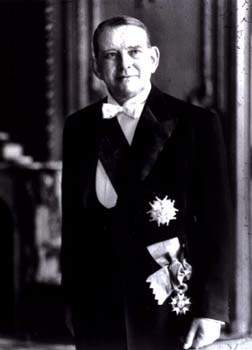- René Coty
Infobox President | name=René Coty

order=17thPresident of the French Republic Co-Prince of Andorra
term_start=16 January 1954
term_end=8 January 1959
vicepresident=
predecessor=Vincent Auriol
successor=Charles de Gaulle
birth_date=birth date|1882|3|20|mf=y
birth_place=Le Havre
death_date=death date and age|1962|11|22|1882|3|20|mf=y
death_place=
spouse=Germaine ("née" Corblet) Coty
occupation=Lawyer
party=CNIP
religion=Roman CatholicRené Jules Gustave Coty (20 March 1882ndash 22 November 1962) was
President of France from 1954 to 1959. He was the second and last president under theFrench Fourth Republic .Early life and politics
René Coty was born in
Le Havre and studied at the University of Caen, where he graduated in 1902, receiving degrees in law and philosophy. He worked as a lawyer in his hometown of Le Havre, specialising in maritime and commercial law.He also became involved in politics, as a member of the Radical Party, and in 1907 was elected as a district councillor. The following year he was elected to the communal council of Le Havre as a member of the Republican Left group. He retained both of these positions until 1919. Coty also served as a member of the
Conseil Général ofSeine-Inférieure 1913-1942, holding the post of Vice President from 1932.With the outbreak of the
First World War , Coty volunteered for the army, joining the 129th Infantry Regiment. He fought at theBattle of Verdun . In 1923, Coty entered theChamber of Deputies , succeedingJules Siegfried as Deputy for Seine-Inférieure. However, by this stage of his political career he had moved away from the Radical Party, and sat as a member of the Republican Union. Between the 13th and the 23rd of December 1930 he served as Under-secretary of State for the Interior in the government ofThéodore Steeg .In 1936, Coty was elected to the Senate for Seine-Inférieure. He was one of the French parliamentarians who, on 10 July 1940, voted to give extraordinary powers to
Philippe Pétain , thereby bringing about theNazi -backed Vichy government. Coty remained relatively inactive duringWorld War II , although he was rehabilitated after the war.Postwar life and presidency
He was a member of the Constiuent National Assembly from 1944 to 1946, and chaired the right-wing "Independent Republican" group, which later became part of the
National Center of Independents and Peasants . Coty was elected to the National Assembly in 1946 as a Deputy for Seine-Inférieure, and from November 1947 to September 1948, he served as Minister for Reconstruction and Urban Planning in the governments ofRobert Schuman andAndré Marie . Coty was elected as a member of the Council of the Republic in November 1948, and served as Vice President of the Council from 1952.Coty stood as a candidate for President in 1953, although it was thought unlikely that he would be elected. However, there were eventually to be twelve ballots, with the right-wing favourite,
Joseph Laniel , never managing to obtain the absolute majority required. Following the withdrawal of another key right-wing candidate,Louis Jacquinot , Coty was finally elected in the thirteenth ballot on 23 December 1953, winning 477 votes against the 329 of the socialistMarcel-Edmond Naegelen . He succeededVincent Auriol as President on 16 January 1954.As President of the Republic, Coty was even less active than his predecessor in trying to influence policy. His presidency was troubled by the political instability of the Fourth Republic and the Algerian question. With the deepening of the crisis in 1958, on 29 May of that year, President Coty appealed to
Charles de Gaulle , the "most illustrious of Frenchmen" to become the last Prime Minister of the Fourth Republic. Coty had threatened to resign if de Gaulle's appointment was not approved by the National Assembly.De Gaulle drafted a new constitution, and on 28 September, a referendum took place in which 79.2% of those who voted supported the proposals. De Gaulle was elected as President of the Republic by parliament in December, and succeeded Coty on 9 January 1959. Coty was a member of the Constitutional Council from 1959 until his death in 1962.
ee also
*
Politics of France External links
* [http://en.wikipedia.org/w/index.php?title=Ren%C3%A9_Coty Find-A-Grave profile for René Coty]
Wikimedia Foundation. 2010.
